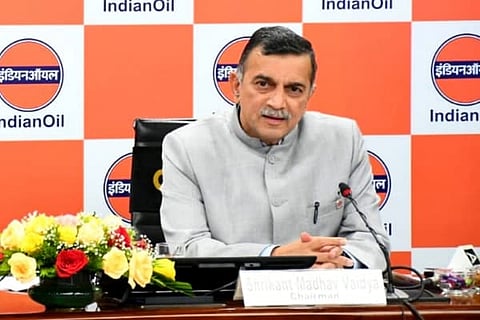
- News Updates
- PSU Watch
- Defence News
- Policy Watch
- हिन्दी न्यूज़
- Jobs Watch
- States News
- Event News

New Delhi: Indian Oil, India's largest fuel refiner and retailer has resolved to achieve net-zero operational emissions by the year 2046. Indian Oil's decarbonisation plans encompass both Scope 1 & 2 emissions. Indian Oil's Chairman Shrikant Madhav Vaidya made the announcement during the company's 63rd Annual General Meeting, held today. The year 2046 coincides with India completing 99 years of independence and the celebration of its 100th Independence Day.
This historic declaration by the country's energy major aligns with India's net zero commitment by 2070 announced as part of the Panchamrit goals by the Prime Minister at the COP-26 Summit last year.
Speaking on the occasion, Vaidya said, "As we embark on the net-zero journey in the right earnest, we already have a well-crafted blueprint in place. It adopts a multi-pronged approach to take us gradually towards the net zero destination. We have envisaged that an investment of over Rs 2 lakh crore will be required to achieve the target by the year 2046. Indian Oil has been pursuing a robust green agenda for some time now, to steer the country's green energy transition. So we are already working on several emission mitigation pathways like green hydrogen, biofuels, renewables, carbon offsetting through ecosystem restoration and Carbon Capture Utilisation and Storage (CCUS), among others."
Sharing details on Indian Oil's net-zero strategy, Vaidya added, "Indian Oil plans to achieve two-thirds of emission reduction through energy efficiency, electrification and fuel replacement efforts, while about a third of the total emission would be mitigated through options such as CCUS, nature-based solutions and purchase of carbon credits."
Currently, Indian Oil's Green House Gas (GHG) emission, emanating majorly from the company's refining operations, stands around 21.5 million metric tonnes of carbon dioxide equivalent (MMTCO2e) per annum. Out of the total emissions, 96 percent are on account of processes like direct fuel burning for deriving energy from heat, steam, electricity and cooling, which are part of operations. These constitute the Scope-1 emissions. The balance 4 percent are on account of sourcing electricity from the grid which constitutes Scope-2 emissions.
(PSU Watch– India's Business News centre that places the spotlight on PSUs, Bureaucracy, Defence and Public Policy is now on Google News. Click here to follow. Also, join PSU Watch Channel in your Telegram. You may also follow us on Twitter here and stay updated.)
